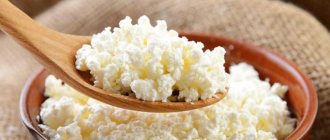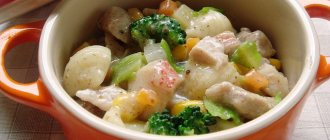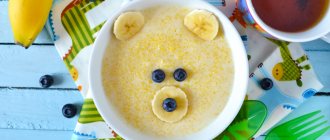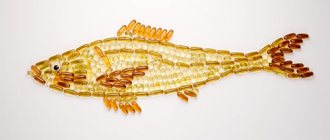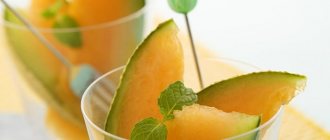The benefits of watermelon during breastfeeding
In the summer, many breastfeeding women are faced with the question of whether it is possible to eat watermelon and melon during lactation, how this can affect the newborn and the woman herself. Let's figure this out.
A good watermelon has fine veins and a slightly uneven surface.
Watermelon contains many vitamins, useful micro- and macroelements that have a beneficial effect on the body of a woman and baby. In certain cases and in doses, it is useful to eat watermelon during pregnancy, just like melon.
The pulp of the product contains the following substances and their beneficial properties for the body:
- Vitamin A - forms fat metabolism, activates the growth of new cells, slows down the aging process, forms the skeleton, bones, teeth.
- B vitamins - support the normal functioning of the central nervous system and cerebral vessels, improve visual acuity, promote the absorption of nutrients, and restore the epithelium.
- Vitamin C - improves immunity, alleviates diabetes, promotes rapid recovery after serious illnesses, and has an antioxidant effect.
- Vitamin E - strengthens blood vessels, improves the functioning of the circulatory system, saturates the body with oxygen, slows down the aging process, prevents the appearance of pigmentation, and has a beneficial effect on accelerating metabolic processes in the body.
- Potassium - normalizes heart rate and blood pressure, improves the condition of the liver and kidneys, and helps cope with depression.
- Silicon is involved in the development of tissue’s ability to recover, has a powerful antioxidant effect, and slows down the aging process.
- Cobalt plays an important role in metabolic processes that are associated with natural blood synthesis, the functioning of the nervous system, enzymatic reactions and liver activity.
- Copper has an anti-inflammatory effect, protects bones from fractures, normalizes the activity of the thyroid gland, and strengthens the immune system.
- Magnesium - relieves symptoms of PMS and menopause, improves mood, and prevents the development of cardiovascular diseases.
- Iron - saturates red blood cells with oxygen and produces hemoglobin.
Such a rich chemical composition has a positive effect on women’s health and, as a result, the health of the baby, since many nutrients enter the child’s body along with milk. Some nursing mothers note that eating watermelon increases breast milk production. Therefore, it can be eaten during lactation, but following certain rules.
The benefits and harms of fruits for a nursing mother and baby
The main harm of watermelon is that the berry intensively absorbs not only useful, but also harmful substances from the soil. The abundance of juice causes fermentation and gas formation processes, causing exacerbation of diseases of the urinary system.
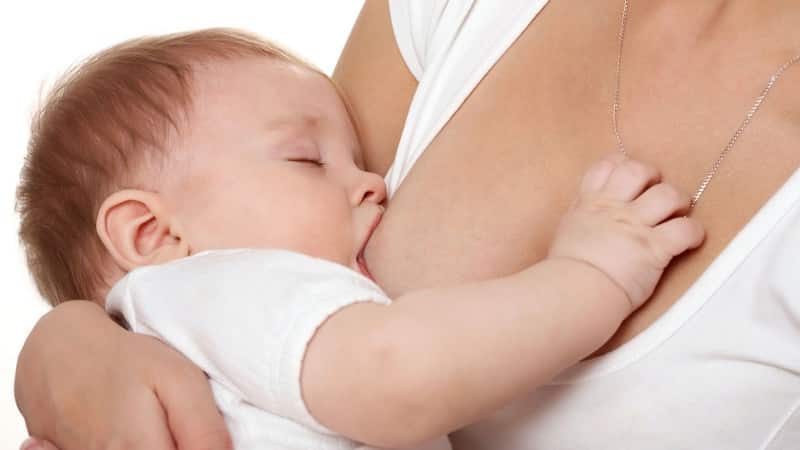
However, the benefits of watermelon for breastfeeding are also great. It contains the following substances:
- vitamins of group B, A, E, C;
- minerals – phosphorus, calcium, magnesium, potassium, sodium;
- a large amount of delicate fiber;
- pectin;
- folic acid;
- lycopene and other antioxidants;
- amino acid citrulline.
The rich scarlet color of the pulp is explained by the high level of lycopene in the composition. This antioxidant has a beneficial effect on the functioning of the cardiovascular system, reduces the risk of cancer, and alleviates bronchial asthma. Together with vitamins A and E, it protects the eyes from age-related changes.
Citrulline is converted into arginine in the body, which improves the efficiency of the immune system. Folic acid has a beneficial effect on the development of the infant's brain. Watermelon juice perfectly quenches thirst and serves as a diuretic.
Why is watermelon dangerous during lactation?
Some women who are breastfeeding still try to avoid eating sweet and aromatic melons because they are afraid of harming the baby. However, their fears are not unfounded.
What are the dangers of eating watermelon during breastfeeding? Firstly, it holds the record for its ability to accumulate nitrates. The nitrogen compounds themselves, also known as nitrates, contained in the soil do not pose any danger. But those contained in watermelon can cause severe harm to the human body.
Secondly, excessive consumption of sweet fruit can lead to a number of negative consequences for both the nursing woman and the child himself. Among the complications:
- vomit;
- increased gas formation;
- diarrhea;
- poisoning.
With such signs, especially if they appeared in the child after the mother ate a watermelon and breastfed the baby, it is necessary to seek medical help.

It is safe to eat watermelon during breastfeeding 4 months after birth
Who can consume watermelon with caution during lactation: restrictions
Despite the undoubted benefits of watermelon, there are also contraindications for its use:
- if a nursing woman has diabetes mellitus or pancreatic diseases, then due to the high sugar content, an exacerbation of these diseases is possible;
- one of the family members (mom or dad) is allergic to watermelon;
- if a woman has kidney stones, then watermelons should be consumed with caution, as the product puts additional stress on the urinary system and can provoke renal colic.
In all other cases, eating watermelon is allowed.
Is it possible to eat watermelon while breastfeeding?
Experts say that eating watermelon during lactation is beneficial for both the woman and the child due to the fact that the sweet fruit saturates the body with vitamins that are useful for the proper growth and development of the child, as well as for improving the functioning of the woman’s body. But some mothers eat the product without harm to their health, while others experience many side effects immediately after consuming it.
In the first month
During the first month after giving birth, a nursing woman must adhere to a strict diet, which does not include watermelon. This is due to the fact that the newborn’s body does not yet have the required amount of enzymes that are capable of digesting such complex food.
If a woman eats a watermelon at this time, the consequences will be severe bloating and severe poisoning in the child, which will lead to hospitalization.
At 1 month after giving birth, a nursing woman should refrain from eating red fruits and berries. Red apples also need to be removed from the diet. Among the side effects that appear in a child whose mother does not follow proper nutrition are rash, hives and severe itching.
In the second month
If the baby has no health problems, he is not bothered by colic, constipation or diarrhea, then by the end of 2 months of his life, a nursing mother can diversify her diet with a small watermelon slice. You cannot eat the fragrant fruit all the time, but you can enjoy a few pieces.
If after eating watermelon the baby’s health and behavior have not changed, you can slightly increase the number of slices. If negative signs appear in the form of a rash, redness, or bloating in the baby’s abdomen, the product should be discarded.
At 3 months
At the age of 2.5-3 months, the baby’s digestive system begins to work in the right mode. At the same time, including watermelon in a nursing woman’s diet carries a certain danger.
If the need for watermelon consumption is high and the fruits are grown in ecologically clean areas, then you can try eating 2-3 slices per week when the baby reaches 3 months. After eating the fruit, you should monitor the baby's reaction. If negative manifestations occur, the product is prohibited.
At 4 months
The digestive system of a child whose age is 4 months is able to withstand almost any food that the mother eats. It is from this period that a nursing woman can enjoy watermelon without fear.
If a woman has not eaten watermelon before this period, then the number of watermelon slices should be increased gradually. To begin with, you can eat up to 2 slices of the aromatic fruit per day, then up to 3, eventually reaching the optimal amount for saturation.
It is necessary to eat watermelon even when a nursing mother does not like its taste, due to the presence in the fruit of a large number of useful elements and vitamins necessary for women’s health and the development of the baby.
Is it possible to eat melons while breastfeeding?
Melon crops include such delicacies as:
- watermelon;
- melon;
- pumpkin.
In the summer season, watermelons and melons come in handy, because they perfectly quench hunger and thirst, and their aromatic and tasty pulp makes them desirable and healthy desserts.
Pumpkin can be consumed almost all year round due to its ease of storage. All three products can be consumed in abundance during pregnancy, however, caution should be exercised during breastfeeding.
Which ones are allowed during lactation?
During breastfeeding, you can eat watermelon, melon, and pumpkin, but at different times.
- Watermelon . This juicy, red berry is a real treasure during lactation, because its pulp consists of 90% water, which means it helps increase milk supply. In addition, it perfectly replenishes microelements lost during pregnancy and childbirth and is necessary for anemia.
- Melon. The aroma of melon instantly attracts sweet tooth lovers and reminds them of hot countries and the shining sun. However, today, more and more often, you can find melon pulp in stores and in dried form. Melon is a source of folic acid, which makes it very beneficial for fetal development in the first trimester of pregnancy.
- Pumpkin. The beneficial properties of this bright beauty can be listed endlessly. The vitamins, minerals and microelements of the orange pulp bring great benefits to both mommy and her little miracle. The orange vegetable is an excellent help in the recovery process after childbirth and allows you to quickly lose the extra pounds accumulated during pregnancy.
From what month after birth?
So, when can a young mother introduce melons into her diet?
- Watermelon should be consumed only when it is in season – no earlier than in August. For its ripening, it requires long exposure to the sun and good watering. If the summer is not sunny, it is better to avoid eating watermelon, as it may contain a large amount of chemicals.
Watermelon is like a sponge - it absorbs all the nitrates and fertilizers used for its rapid growth. The ingress of such harmful substances can cause serious harm to the still fragile organism of the mother and child.Watermelon can be included in a nursing woman’s diet from the 2nd to 3rd month of a child’s life, carefully observing any changes in the baby’s skin and stool.
- The season for melons, like watermelons, is late summer, early autumn.
But you shouldn’t rush to introduce melon into your diet in the first months of lactation. The fact is that melon contains a large amount of sugar, and this leads to fermentation and, as a result, colic and disruptions in the baby’s gastrointestinal tract. Melon can also be introduced into the diet when the baby is 3 months old. During this period, enzymes are already produced in the child’s intestines that help absorb new microelements. - Unlike other melons, pumpkin is available in any season, provided it is properly stored. However, during breastfeeding, you should give preference to fresh fruit, purchased shortly before consumption. It can be consumed already on the 10th day of lactation, naturally, first in small quantities.
How to choose the right watermelon
The main rule when choosing a watermelon is its seasonality. It is best to buy sweet fruits at the end of August, by which time they have time to ripen naturally without the use of various chemicals.
It is advisable to buy watermelon only from trusted sellers who have a quality certificate for their products.
The size of the fruit also matters. It is better to choose ones whose weight does not exceed 5 kg, since such a weight is natural for a ripe fruit. Too large fruits are oversaturated with nitrates and other fertilizers.
At the same time, watermelons that are too small are picked ahead of schedule and are most often unripe. In addition, they do not contain enough vitamins and minerals.
A ripe watermelon should exude a pleasant, sweet aroma. If the product does not smell of anything, then it is better to choose another fruit.
Do not buy fruits that are burst, limp, cut, or soft with dents. It is also advisable to refrain from buying melons that are piled on the ground or sold along the highway.
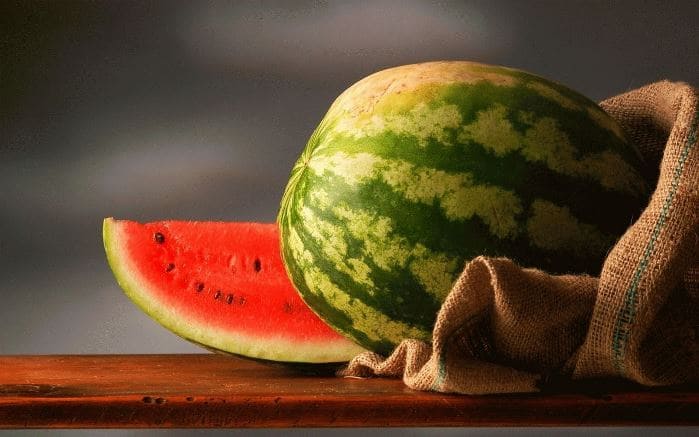
Ripe watermelon has a pleasant aroma
Signs of a ripe watermelon
By these signs you can understand that this is a ripe watermelon:
- The tail is moderately dry and brown, with a yellow-orange spot on the side. Such indicators indicate the maturation of the fetus in its natural environment. An excessively dry tail indicates long-term storage.
- The rind is strong, dark green with bright black stripes along the fruit. The watermelon should not have cracks, dents or other damage.
- The pulp should have thin veins and be slightly uneven in color. Yellow veins and a smooth cut mean a low-quality product and should not be purchased.
How to eat watermelon during gw
If you follow certain rules for consuming watermelon during lactation, you can minimize the risk of complications for both the woman and the baby. These are the recommendations:
- Before eating, watermelon must be thoroughly washed under running water, preferably with soap.
- Let one of your relatives eat the watermelon first. If after some time there are no side effects, then a nursing woman can eat it.
- Watermelon should be introduced into the diet gradually to monitor the child’s reaction to it.
- How much watermelon can you eat per day with gw? It all depends on the age of the child, the older he is, the more. It is not advisable to eat watermelon until 4 months after birth, then you can eat up to 2-3 slices per week.
- It is not advisable to combine watermelon with drinks, bread, or eat it immediately after a heavy meal. Otherwise, it may cause increased fermentation in the stomach and increased gas formation. Also, such eating behavior can negatively affect the entire functioning of the gastrointestinal tract, which is fraught with complications for a child’s fragile body.
Watermelon and melon during lactation
To get an answer to the question about the advisability of eating melon and watermelon during lactation, you should take into account the age of the baby. If its age is up to 3 months, it is better to discard these berries. This is due to the occurrence of fermentation processes in the stomach after their consumption, which will cause stomach colic in the baby.
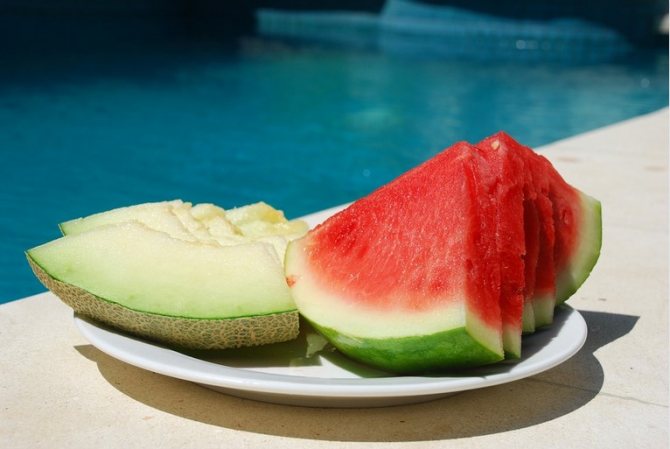
Even if the baby is more than 3 months old, mothers who plan to continue breastfeeding need to gradually introduce these crops into their diet. Having eaten a small piece of melon or watermelon for breakfast, after the feeding process you should monitor the baby’s condition and his reaction to the introduction of a new product. If there are no side effects, you can increase the portion of berries. It is acceptable to eat 2-3 slices of watermelon and melon once a week.
Do not drink melon with water or alcoholic beverages. Like all fruits, melon must be tested for nitrates. If a baby develops a rash and fever after eating watermelon or melon by a mother who continues to breastfeed, you should immediately call a doctor at home.

How to increase milk supply while breastfeeding?
How to use a breast pump correctly? Read here.
Tips for mothers when breastfeeding - read here.
Reviews
Victoria, pediatrician
I do not recommend that breastfeeding women introduce watermelon into their diet until the baby is 4 months old. This is due to the fact that watermelon poisoning occurs quite often, which is dangerous for the woman and the child herself.
Samira, gynecologist
Breastfeeding is a period in a woman’s life no less important than pregnancy itself. At this time, a woman should pay more attention to her diet in order to minimize the risk of developing health problems for the baby. In the summer, many women come with the question of whether it is possible to eat watermelon during breastfeeding and how this will affect the child. If you use a high-quality product in small quantities, it will have a positive effect on both the woman and the baby.
Karina, 29 years old
I read a lot of reviews on women's forums about whether it is possible to eat watermelon during guards. I saw more positive reviews. Personally, I ate watermelon, but no more than 1 slice a day, when my son was 2 months old, there were no problems.
Inga, 31 years old
I ate watermelon when my daughter was 3 months old. After this she developed severe diarrhea. As the doctor explained, this is how a negative reaction to the product manifested itself. Therefore, I had to completely exclude this sweet fruit from the diet until breastfeeding was completed.
So is it possible or not to eat watermelon while breastfeeding? If you use it correctly, it will have a positive effect on the health of the nursing mother and the baby itself. If a child experiences negative reactions after consuming this product, it is recommended to completely exclude it from the diet until breastfeeding is complete.
When can you eat while breastfeeding?
If there are no diseases that prohibit the consumption of watermelon, then the expectant mother can consume it in moderation. It is important to monitor the baby's reaction.
If after eating the pulp signs of an allergy appear, you need to stop eating the product and show the child to a specialist.
You should not eat watermelon while breastfeeding in the second month, if the baby is not yet 3-4 months old - he is still very weak.
Do not eat fruits immediately after eating, do not mix them with other foods.
It is better to use them as a tasty and healthy snack.
Only high-quality, ripe watermelons, devoid of chemical components, bring benefits. It is important to be doubly attentive to your choice and choose products taking into account all the recommendations of experts.
